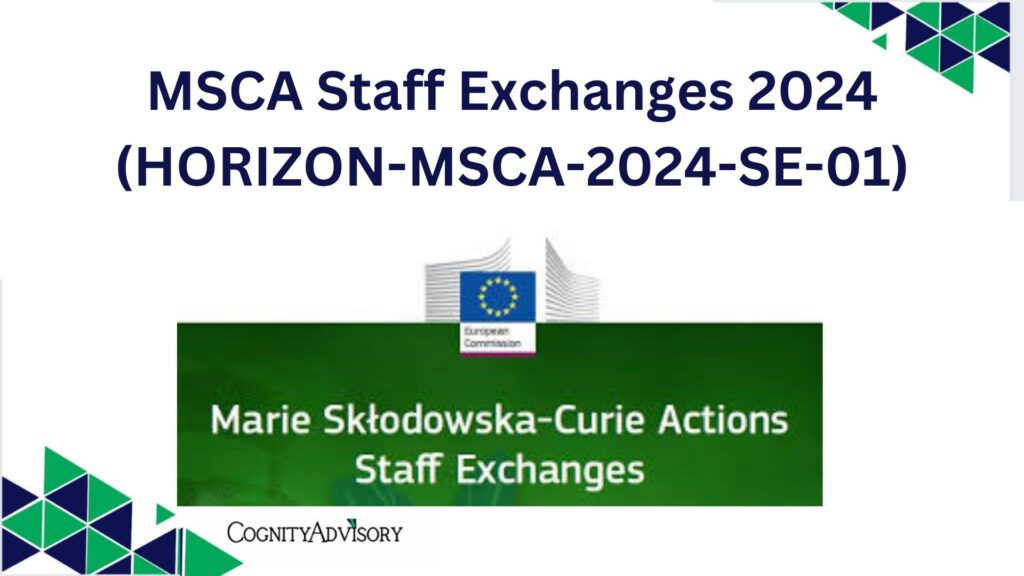HORIZON-MSCA-2024-SE-01-01
General information
Programme
Horizon Europe Framework Programme (HORIZON)Budget overview
Call
MSCA Staff Exchanges 2024 (HORIZON-MSCA-2024-SE-01)
Type of action
HORIZON-TMA-MSCA-SE HORIZON TMA MSCA Staff Exchanges
Type of MGA
HORIZON Unit Grant [HORIZON-AG-UN]
Forthcoming
Deadline model
single-stage
Planned opening date
19 September 2024
Deadline date
05 February 2025 17:00:00 Brussels timeTopic description
ExpectedOutcome:
Project results are expected to contribute to the following outcomes:
For staff members
- Increased set of research and transferable skills and competences, leading to improved employability and career prospects within and outside academia;
- More knowledge and innovative ideas converted into products, processes and services;
- More entrepreneurial mind-sets, testing new and innovative ideas;
- Increased international exposure leading to extended networks and opportunities;
- Enhanced networking and communication capacities with scientific peers, as well as with the general public that will increase and broaden the research and innovation impact.
For participating organisations
- Innovative ways of cooperation and transfer of knowledge between sectors and disciplines;
- Strengthened and broader international, inter-sectoral and interdisciplinary collaborative networks;
- Boosted R&I capacity.
Scope:
MSCA Staff Exchanges involve organisations from the academic and non-academic sectors (including SMEs) from across the globe.
Support is provided for international, inter-sectoral and interdisciplinary mobility of R&I staff leading to knowledge transfer between participating organisations.
Mobility through secondments
The organisations constituting the partnership contribute directly to the implementation of a joint R&I project by seconding and/or hosting eligible staff members. Such a project must explore activities that can be based on previous work but should go beyond and generate or strengthen long-term collaborations. Secondments must involve physical mobility[1] of the eligible staff members and must always take place between legal entities independent from each other.
MSCA Staff Exchanges can address three dimensions of mobility: international, inter-sectoral and interdisciplinary[2]. While exchanges between organisations within EU Member States and Horizon Europe Associated Countries should mainly be inter-sectoral, same-sector exchanges[3] are also possible under the condition that they are interdisciplinary. Interdisciplinarity is not required for same-sector exchanges with non-associated Third Countries.
Secondments between institutions established in non-associated Third Countries or within the same EU Member State or Horizon Europe Associated Country are not eligible.
The collaborative approach of MSCA Staff Exchanges should exploit complementary competences of the participating organisations and create synergies between them. The secondments should be essential to achieve the joint project’s R&I activities. The project should inter alia enable networking activities and the organisation of workshops and conferences, to facilitate sharing of knowledge and testing of innovative approaches for specific R&I topics.
Skills’ development
For participating staff members, the project should offer new skills acquisition and career development perspectives. Participating organisations must ensure that the seconded staff are adequately mentored.
[1]Virtual mobility is not allowed for secondments.
[2]Interdisciplinarity means the integration of information, data, techniques, tools, perspectives, concepts or theories from two or more scientific disciplines (see definitions at the end of this Work Programme part).
[3]See specific conditions at the end of this Work Programme part.Show lessTopic destination
MSCA Staff Exchanges (2023/24)
MSCA Staff Exchanges promote innovative international, inter-sectoral and interdisciplinary collaboration in research and innovation through exchanging staff and sharing knowledge and ideas at all stages of the innovation chain. The scheme fosters a shared culture of research and innovation that welcomes and rewards creativity and entrepreneurship and helps turn ideas into innovative products,
